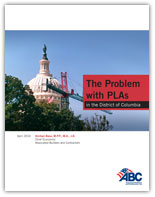New Report Says Anti-Competitive PLAs Won’t Help District of Columbia Economy
A new report on government-mandated PLAs, “The Problem with PLAs in the District of Columbia,” was released today.
Focusing specifically on the D.C. construction market, ABC Chief Economist Anirban Basu’s report examines the existing data indicating whether government-mandated PLAs make sense in the District of Columbia.
Here is a key finding from the report:
“In the context of the current construction economy, government PLA mandates appear likely to have a destabilizing impact on an already depressed industry in the District of Columbia, leading to reduced employment of local residents and considerable harm to small and disadvantaged businesses.”
The study contains compelling economic data indicating that PLAs make little sense in the District of Columbia construction market.
Feel free to post questions or comments in this post’s comment section.
Below is a press release on the study.
For Immediate Release
March 31, 2010
New Study Reveals D.C. Council Project Labor Agreement Legislation Would Hurt Local Workers
WASHINGTON, D.C. (March 31, 2010) – A new study from Associated Builders and Contractors (ABC) assessing the economic implications of government-mandated project labor agreements (PLAs) on construction projects in the District of Columbia determined that implementing PLAs would hurt local workers and businesses.
The D.C. Council is considering legislation, the District Resident Employment and Trade Stimulus Act of 2010 (Bill 18-650), that would place PLAs on all government-assisted projects costing more than $200,000 in D.C. PLAs are controversial pre-hire agreements between construction contractors and labor unions that mandate the use of union rules for the duration of a particular construction project.
“Our study found that it is bad economic policy for the D.C. Council to enact PLAs on construction projects in the area,” said ABC Chief Economist Anirban Basu, author of the study.
“In the context of the current construction economy, government PLA mandates appear likely to have a destabilizing impact on an already depressed industry in the District of Columbia, leading to reduced employment of local residents and considerable harm to small and disadvantaged businesses. PLAs also would deprive taxpayers of the benefits of open competition from local contractors because these agreements favor union workers, who comprise a minority of the local construction workforce,” said Basu.
“Quality local firms like my company have successfully built public works projects in the District free of PLAs for decades,” said Jim Anglemyer, president of WCS Construction, LLC, a construction contracting firm based in Washington, D.C. “There is no reasonable justification for PLAs in the District. This legislation is special interest politics; the D.C. Council should be supporting all local businesses rather than choosing favorites. The construction industry is already experiencing record unemployment of 27 percent, and creating jobs for elected officials’ political patrons would be another blow to qualified district contractors and their local employees.”
“Anti-competitive PLAs are special interest schemes that end open, fair and competitive bidding on public works projects,” said Ben Brubeck, ABC’s director of federal procurement and labor affairs. “PLAs discourage most nonunion contractors from competing for these jobs because it’s so costly for them and their employees, and that puts them at a disadvantage against union firms in the bidding process.”
A pro-PLA Executive Order 13502 signed by President Obama, expected to be approved by the federal government in the coming weeks, also may affect the District’s construction recovery.
“President Obama’s order to encourage the use of PLAs on federal construction projects costing more than $25 million could determine whether PLAs will be used on upcoming D.C.-area construction projects built by the federal government. The D.C. Council legislation, coupled with President Obama’s pro-PLA executive order, has the potential to make it impossible for D.C.’s nonunion contractors and employees to earn a living and put D.C. residents to work,” Brubeck added.
The full study is available here or at www.abc.org/plastudies.













One Response to New Report Says Anti-Competitive PLAs Won’t Help District of Columbia Economy
[…] This post was mentioned on Twitter by machinecontrol. machinecontrol said: New Report Says Anti-Competitive PLAs Won't Help District of Columbia Economy – The Truth About PLAs http://su.pr/ADRryS […]